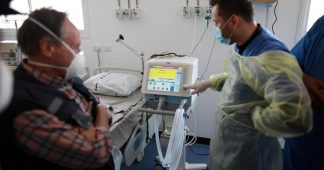By Muhammad Hussein
May 19, 2022
Over the past year, the European Union has delayed the transfer of hundreds of millions of Euros in its annual aid to the Palestinian Authority (PA), solely over the allegations that the PA’s school textbooks contain some content deemed “anti-Semitic”.
The restriction of the annual funding – last year’s as well as this year’s – came after Oliver Varhelyi, a Hungarian diplomat and the EU’s commissioner for neighbourhood and enlargement in Brussels, proposed that the aid to the PA should be conditional on the removal of “problematic content” in the school textbooks.
With the €214 million ($235 million) in aid being halted until a final decision is made by the European Commission (EC), Palestinians in the West Bank and the Gaza Strip are already suffering. Salaries of staff, teachers, doctors, and government workers have gone unpaid, and hospitals and the healthcare system, overall, are running on extremely low capacity and resources.
Out of the €214 million, around €150 million ($165 million) is reserved solely for the PA’s budget for salaries, infrastructure projects, and civil society groups. Due to the PA’s heavy reliance on funding from the EU and foreign aid, generally, the bloc and western nations such as the US and UK often attempt to use that leverage against Ramallah to extort political compliance. Varhelyi’s proposal is just the latest occurrence of that dynamic.
Over a year after that proposal was first initiated in April 2021, it has neither yet been adopted nor has it been struck down, as it failed to reach a majority vote of 14 countries. For now, the issue remains under discussion and dispute within the EU and its parliament, until the EC and its President, Ursula von der Leyen, make a decision on it.
Even if the proposal is passed through and the PA is forced to abide by the condition, however, it would not be the entire €214 million at stake, but €10 million of the aid, according to Martin Konecny, the Director of the Brussels-based NGO, European Middle East Project (EuMEP).
Speaking to Middle East Monitor, Konecny stated that “the EU is not applying conditionality on changes to textbooks anywhere else in the world. So this is quite a unique idea, as if Palestinians were somehow uniquely hateful in their education.” The issue is “definitely a double standard,” he confirmed.
Over the years, there have also been significant concerns regarding biased and inciteful content against Arabs and Palestinians seen within Israeli school textbooks. Yet, the EU has never drawn attention to the content pushed by Israel’s education curriculum, which is “inherently biased”, said Konecny. “The fact is that the EU funds the Palestinian education sector not the Israeli one. But you cannot only look at the textbooks on one side of this conflict, particularly if it’s the occupied society.”
He cited a study funded and backed by the US government a decade ago, which looked at both Palestinian and Israeli textbooks and found that they both encourage bias and rivalry against each other. “So the EU could have done it [similarly], but chose not to do so,” he said, adding that “it’s as if only the Palestinians were capable of incitement.”
The one-sided scrutiny of the PA’s textbooks ties in, essentially, to the general lack of accountability and conditionality in relations between the EU and Israel. “Israel is part of Horizon Europe, which is a massive EU programme for the support of research and innovation. There are no political conditions on benefiting from that programme.”
The fact that Varhelyi, a Hungarian diplomat, put forward the proposal for the reform of Palestinian textbooks to be a condition for the continuation of EU aid is also of interest, as Budapest has long favoured Tel Aviv and has repeatedly blocked EU declarations regarding their conflict.
When asked about whether Varhelyi – who has been questioned by members of the European Parliament (MEPs) before over his loyalties to Hungary’s far-right Prime Minister, Viktor Orban – is carrying out his government’s interests within the EU, Konecny said “you cannot delink Varhelyi’s conduct in Brussels from Hungary’s foreign policy orientation, which has been to align closely with Israel.” He did, however, clarify that “it doesn’t mean that this was coordinated with Orban or the Hungarian government.”
If Varhelyi is, indeed, conducting Hungarian foreign policy activities from his post in Brussels, then it would match up with his previous and ongoing efforts to influence the political situation in the Balkans, where he and Orban have lobbied for Serbia’s accession to the EU, despite concerns over the state of its democracy. Many would classify such influence as the far-right’s infiltration into the EU and its policies.
As the dispute over the conditionality of aid to the PA continues and remains within the confines of EU institutions, all there is to do for now is to wait for the EC’s and President von der Leyen’s weighing in on the issue. It should have been finalised months ago, according to Konecny, who said “it’s really very strange that this is still dragging on … there’s nothing to wait for.”
That is also where speculation comes in regarding the EC and its President’s silence on the issue and the delay of its judgement. Dismissing claims by some of direct bias against the Palestinian side, Konecny noted that “accusations of anti-Semitism are being made in this context, which is a politically highly-sensitive issue for the Europeans, and for Germans doubly so.”
“Nobody wants to be attacked and criticised for allegedly being too soft on the issue of anti-Semitism,” he reasoned.
It is yet to be seen whether the EU will reduce its aid to the PA or refuse to make the textbook issue a condition for the aid. Whatever the decision, though, the fact remains that the longer the bloc continues to withhold the funds, the more Palestinians, essential workers, hospitals, and tens of thousands of families are deprived of necessary and life-saving financial aid. The blackmail must cease.
We remind our readers that publication of articles on our site does not mean that we agree with what is written. Our policy is to publish anything which we consider of interest, so as to assist our readers in forming their opinions. Sometimes we even publish articles with which we totally disagree, since we believe it is important for our readers to be informed on as wide a spectrum of views as possible.











